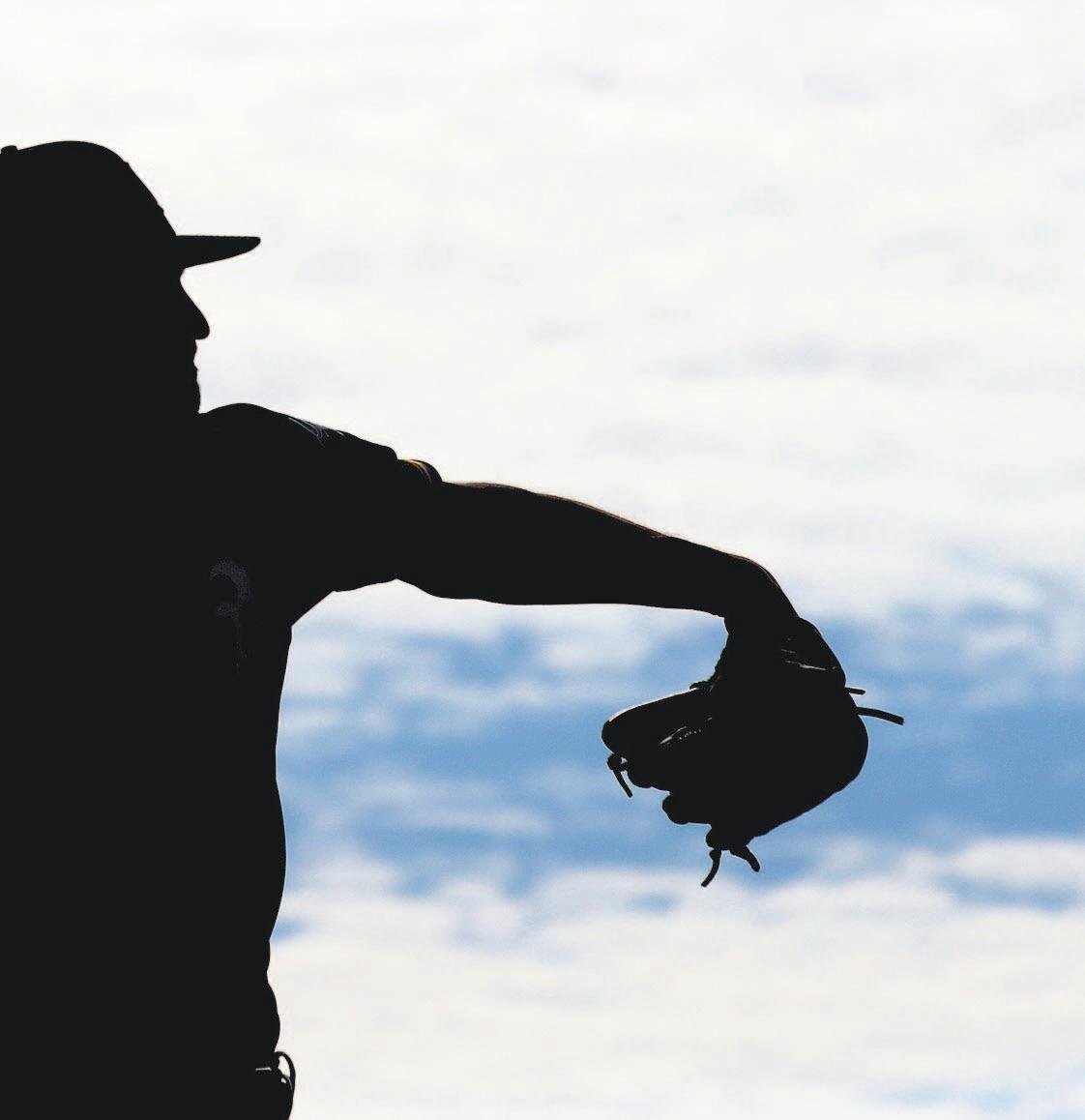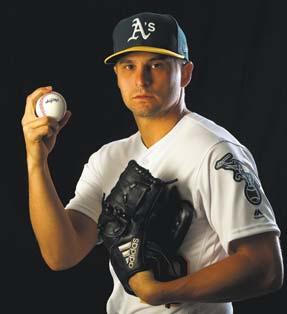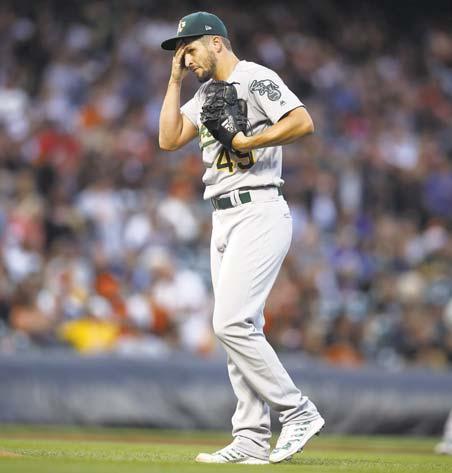
10 minute read
THE KNIFE FIGHTER
KENDALL GRAVEMAN IS ONE OF THE NICEST GUYS YOU’D EVER WANT TO MEET. JUST DON’T MEET HIM ON A BALLFIELD.
STORY BY MARTIN GALLEGOS

A’s pitcher Kendall Graveman is one of the loosest guys in the clubhouse, but around an hour before game time, he flips a switch.
And suddenly, the 6-foot-2 right-hander becomes a bad man.
“Some of our kids would call him a knife fighter,” said Mississippi State athletic director John Cohen, Graveman’s college coach for four years. “You step between the lines, someone is gonna get cut up. He was that deadly serious when he stepped out on the field.”
Graveman brought that demeanor with him from Alexander City, Alabama, where he played for his dad from Little League through high school.
“He wanted me to be respectful and a nice guy, but once you cross that white line to go play baseball, it’s time to compete,” Graveman said. “That’s something in my childhood that kind of stuck and is still there today.”
It’s something the A’s desperately need from Graveman. They also need him to stoke the competitive fire of the other starters. At 27, Graveman will be the senior member of the Oakland rotation. With 71 major league starts, he also is the most experienced. His numbers — 22-24 with a 4.11 ERA — are hardly imposing.

And yet, there is something about him.
No less an authority than Dave Stewart sees it. Asked which current A’s player would best fit with the powerhouse rotations that Stewart anchored from 1987-92, the four-time 20-game winner didn’t hesitate: Kendall Graveman.
“I think he would have fit right in,” Stewart said. “His work ethic is unmatched by anybody on this current team. He goes about his business and competes. He likes to take the ball. I think Kendall fits.”
Cohen called Graveman “a college version of Dave Stewart. That look on his face. That level of competitiveness. That attack mode on the mound.”
Graveman said he doesn’t feel worthy of the comparison, at least not yet, but it is nice to hear.
“The greatest compliment as a competitor is someone that’s willing to go out there and give it his all, good or bad,” Graveman said. “When you watched Dave Stewart, he wasn’t gonna leave anything out there. I think that’s what makes me rest easy at night. Knowing I fought for my team that day.”
Oh, he’ll fight.
In Graveman’s senior year at Mississippi State, the Bulldogs went to the College World Series (where they lost in the final to UCLA). Their run began on a Sunday afternoon in a regular-season game against Southeastern Conference rival Louisiana State.
Mississippi State had lost the first two games of the series.
Graveman, the Sunday starter, flipped the switch and became that bad man, the knife fighter. He threw a fastball behind the head of LSU first baseman Mason Katz, prompting LSU manager Paul Mainieri to sprint from the dugout as he argued for Graveman to be ejected. Graveman stayed in the game and earned the win, starting a 20-14 run that took the Bulldogs to the NCAA tournament.
“I felt like I needed to protect my teammates,” Graveman said. “Looking back, it might not have been the smartest thing to do, but they wore us out the first two nights. It was a game that we ended up winning and kind of flipped our season.”
Cohen described Graveman as the greatest competitor he has coached over his 25 years in baseball.
“This kid is different. He is the model of consistency in terms of bringing it every day. You wish everyone can be like Kendall Graveman,” Cohen said. “So much presence. So much moxie.”
Giants pitcher Chris Stratton spent three years at Mississippi State with Graveman and said he never has known a nicer guy. The two became good friends, were in each other’s weddings and often go out for dinner together during spring training.
But Stratton has seen what happens when Graveman takes the mound.

“He’s the most competitive guy I’ve ever played with,” Stratton said. “He just has that fire, especially when he’s on the mound. It’s definitely intense. When he gets on the bump, it’s time to go.”
While Graveman believes his intensity is mostly a positive, there have been times where he has let it get the better of him. There were times in college when he would get into heated arguments with Cohen and pitching coach Butch Thompson after games in which he would get removed early.

Graveman still finds himself trying to harness that intensity, but he believes he has better control of it now as he has matured in the big leagues.
It’s been a meteoric rise to the top of the A’s rotation for Graveman. Drafted by the Toronto Blue Jays in 2013, it took him less than a year to earn a September call up with Toronto in 2014.
“It was always those moments where something inside of me clicked. I really don’t know why it’s like that,” Graveman said. “Some people have it, some people don’t. I don’t so much like winning, I just really hate losing.”
Looking to set the tone, Graveman took the responsibility this spring of calling early-morning meetings for all the pitchers in camp. The message: developing a competitive spirit not only against opponents but also among themselves.
“This is going to benefit all of us. Not everybody goes about it the same way,” Graveman said. “You look at Jake Peavy, one of the greatest competitors I’ve seen on the mound. This guy was out there cussing at himself when he did good and when he did bad. Then you look at someone like Corey Kluber; they say he’s like a robot out there, but he’s competing just as much. Two totally different demeanors.

“Within this pitching staff, I’m not trying to make everyone compete the way I do. But as long as you’re competing and we know that, it’s going to come off different to everyone. The guys that are behind them playing defense know they’re going to get a guy that’s not scared and competing every pitch. I think if we can do that over a 162-game stretch, we’ll all be better for it. We gotta find our own little way to compete.”
It’s been a fast rise to the top of the A’s rotation for Graveman. After being drafted by the Toronto Blue Jays in 2013, it took him less than a year to earn a September call-up, then he was traded to the A’s two months later in a deal for Josh Donaldson. Graveman has gone from the young rookie of the rotation to the top dog after three seasons.
Pitching is key to any team’s success, but for the A’s, given their offensive promise, that might be inordinately true. With three inexperienced starters on the back end of the rotation, a leader is needed up front.
Cohen believes the A’s have the right man for the job.
“You want this guy in your clubhouse. I don’t care what sport. I don’t care what organization or what business. This is the guy you want leading,” Cohen said. “In baseball, you’ve got all the measurables, but what’s hard to measure is that makeup. That thing that affects other people. He’s just got it. He’ll be a great leader for the A’s.”
As the walking epitome of the A’s slogan, Dave Stewart truly is “Rooted in Oakland.” With the team celebrating its 50th season in the East Bay, the native son was a perfect candidate to catch up with given his lifetime connection with the club. Stewart, who stopped by spring training for a week to work with A’s pitchers as a special instructor, agreed to sit and chat about topics such as playing Little League baseball with Rickey Henderson, his showdowns with Roger Clemens, the current state of baseball, memories of the late Bob Welch and why his foray as a general manager didn’t go so well.
QBeing an Oakland native, what did it mean to you to be able to play for the team you grew up watching?
AThat was a dream come true. I grew up blocks from the Oakland Coliseum. I had an opportunity to watch the A’s come here in 1968 when they were a very young up-and-coming team. Blue Moon (Odom), Vida (Blue), Reggie (Jackson), Dave Duncan. To have an opportunity to watch those guys and see the championships from 1972-74, and then to actually come here and play was amazing. A lot of times you come back to where you were raised, and you don’t necessarily play good. But to come home and win a championship, it’s a dream come true.
QWhat was it like to play alongside Rickey Henderson on the same Oakland Little League team?
AWe played against each other and with each other as kids. Those days were competitive. Rick has always been a great athlete in all sports. He was a good baseball athlete, great football athlete and a good basketball athlete. There’s not much different about Rickey today than when
“A lot of times you come back to where you were raised, and you don’t necessarily play good. But to come home and win a championship, it’s a dream come true.” he was growing up. He’s always had a style, which I always called it the “Rickey Style.” He’s always had some type of flair. He’s always done things according to Rickey.
It was great growing up with Rickey, Lloyd Moseby, Gary Pettis — all those guys were great. Not to mention Al Woods, who’s also from the Bay Area, Cleo Smith, you’ve got Marvin Webb, Glenn Burke, there’s a bunch of guys that came out of the Bay Area that were all playing at the same time. Charlie Beamon ... all of us had an opportunity to touch the big leagues at some point.
QLooking at these current A’s, is there anyone you think would have been a good fit with your Oakland clubhouses of the 1980s?
AKendall Graveman would have been a good fit. I think he would have fit right in with Welchie (Bob Welch) and myself, Mike Moore, Curt Young, who was his pitching coach for a while. His work ethic is unmatched by anybody on this current team. He goes about his business and competes. He likes to take the ball. I think Kendall fits. And I like Chris Hatcher out of the bullpen. Take the ball and compete. He takes responsibility for anything that happens out there, and that’s how Dennis Eckersley was and Gene Nelson, Rick Honeycutt, that group of guys.
QThat era of A’s baseball you played in was so special. There was a magic about it. Given the way the game is played today, is something missing from today’s game that makes that vibe you guys had something difficult to replicate?
AThe workload is different, especially the pitching part of the game. Pitchers don’t do as much. They’re not required to do as much. The days of 14 or 15 complete games in a season are done. You make 36 or 37 starts, those days are done ... 250, 260, I think I had 270 to 280 innings pitched one year, you’ll never see that again. And I would almost dare anybody to win 20 (games) four years in a row. I would not have been able to accomplish that I had not been able to go out and throw innings.
QWhat was it about those matchups with Roger Clemens that seemed to bring out the best in you?
AI had a chip on my shoulder every start. I was the No. 1 starter, and there’s a responsibility that goes with that. Nobody ever told me that I was responsible, I took it upon myself to be responsible. I was in the best of condition and shape that I could possibly be. I made my starts every fourth or fifth day, whatever I was called to do, but more importantly, competed against the best. I gave us an opportunity and a chance to win, and I wore that with pride. I was prideful of my position. So with Roger, Jack Morris, Frank Viola, Ron Guidry — you can pick anybody in that period of time — with those guys, you could lose a game in the first inning. If you give up one run in the first, all those guys were capable of shutting you out. Roger was the guy that everybody looked at as being the best in that period of time. I’m not trying to take that from him, but I can tell you what, I put a few kinks in his armor. I wasn’t gonna let Roger beat me. That’s the way I looked at it.
QDo you have a favorite player to watch in MLB today?
AI enjoy watching Madison Bumgarner from the Giants. I enjoy watching King Felix (Hernandez) from Seattle. Those guys are old school. They could have played in any era of baseball. They take the ball and they wear it. It’s gonna be a tough day when they’re on the mound. When it comes to position players, you gotta love (Giancarlo) Stanton. You gotta love (Buster) Posey from the Giants. I enjoy watching
(Anthony) Rizzo from the Cubs and (Jose) Altuve, who in my opinion, people say he’s one of the best “small” players in the game, but he plays big. He’s one of the best players in the game, I really love watching him play. How can you not like watching (Mike) Trout play. That guy represents every tool of the sport.
QYou’ve coached in baseball, you’ve been a general manager, been an agent. Were any one of those roles particularly harder than the others?
AI think they’re all tough in their own ways. Being a general manager in Arizona was probably the toughest role that I’ve had, and it was only tough because I had three bosses. If I only had one person that I needed to report to and talk to, I think the job would have been easier. But it’s really difficult to get something done when you have to run it past three people and you have to manage three personalities.
QBob Welch was a really good friend of yours. Is there a favorite story or memory that you have of him?
ABobby and I were together since 1978 back in the Dodger days. There are thousands of stories I can tell about Bobby Welch. We were at Municipal Field doing our spring training games, and we always did our long distance running out of the stadium. One time Bobby and I went for a run, and we had run for so long that I stopped and said, “Bobby, where are we?” He didn’t know where we were, and he said, “Man, let’s just keep running.” So we start running a little bit longer, and I decided that I’ve had enough. I had run so far that I had to get a cab back to Municipal Stadium. It was an $8 cab ride, which was a lot back in those days — that’s how far we had run. There’s just endless stories and endless memories. Bobby was one of my best friends.






